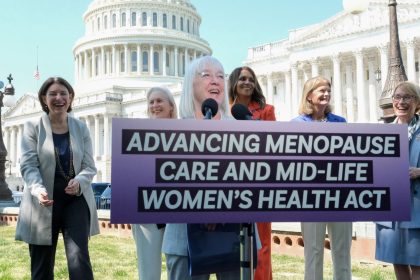AMA’s First Gay President to Take Over at Tumultuous Time

CHICAGO (AP) — The first openly gay person to lead the American Medical Association takes the reins at a fractious time for U.S. health care.
Transgender patients and those seeking abortion care face restrictions in many places. The medical judgment of physicians is being overridden by state laws. Disinformation is rampant. And the nation isn’t finished with COVID-19.
In the two decades since Dr. Jesse Ehrenfeld first got involved with the AMA as young medical resident, the nation’s largest physicians’ group has tried to shed its image as a conservative self-interested trade association. While physician pocketbook issues remain a big focus, the AMA is also a powerful lobbying force for a range of public health issues.
Two years ago, the AMA won widespread praise for announcing a plan to dismantle structural racism within its ranks and the U.S. medical establishment. It has adopted policies that stress health equity and inclusiveness — moves that inspired critics to accuse it of “wokeness.”
At 44, Ehrenfeld will be among the AMA’s youngest presidents when he begins his one-year term on June 13. An anesthesiologist, Navy combat veteran and father of two young children, he spoke recently to The Associated Press about his background and new job.
The conversation has been edited for clarity and length.
Q. Why is your being part of the LGBTQ community a big deal at this moment and how will it inform your role as AMA president?
A: I didn’t run as a gay man. That’s not my platform, but it’s a part of my identity. And people know that.
Representation and visibility is so important. I can’t tell you the number of emails, letters, phone calls, text messages that I got when I was elected into this role from people around the world that saw this as an important moment, an important recognition of what inclusivity and equality can be to help advance health equity for everyone.
Q: How will your experience as part of the LGBTQ community inform and influence your new role?
A: I’ve experienced the health care system as a gay person, as a gay parent, as in many ways wonderful positive experiences and other ways, some deeply harmful experiences. And I know that we can do better as a nation. We can do better as a system that can lift up health. And I expect that there’ll be opportunities to shine a light on that during my year as president.
Q: What are examples of those experiences?
A: There’s so many times where our health care system just does not accommodate people who aren’t in the majority. As a gay parent and a gay dad, I can’t tell you how many forms I filled out where there’s a place for the mom and a place for the dad. It’s a small thing. But it’s a signal that we’re different and maybe we’re not welcome or accepted.
When you have those small, subtle irritations that add up day after day after day, whether you’re an LGBT person or from a minority group, that causes stress. These friction points … are so pronounced for so many who are in underserved communities, so many in the LGBT community, and particularly for transgender individuals. And I know we can do better.
I’ve been fortunate to have two beautiful boys brought into this world with the support of an incredible group of physicians. But there were definitely lots of moments along the way where it was clear that we were a little bit different than everybody else in a way that didn’t need to be.
Q: This seems like an unprecedented time for political interference in medicine.
A: I’m deeply concerned about government intrusion into decision-making for patients. The Supreme Court ruling around abortion has had profound implications for reproductive rights. And fundamentally, patients have a right to access evidence-based health care services. That includes comprehensive reproductive health care. It includes care for transgender people.
States that ban abortion, that ban health care for transgender youth are placing the government right into the patient-physician relationship. And we know that this leads to devastating health consequences and can jeopardize lives. The AMA continues to speak out against these kinds of actions.
Q: What power does the AMA really have to protect those rights?
A: I don’t think we’re powerless at all. The AMA was deeply involved in helping the Biden Administration put out guidance to help physicians and patients understand that you don’t have to disclose private medical information to third parties. And we’ll continue to call for things like unrestricted access to (the abortion drug) mifepristone.
Q: Are you discouraged by the number of states that seem to be jumping on this bandwagon?
A: I’m an optimist. There are particular political divisions that are different right now. The attack on science, the attack on following the evidence to deliver care is new. Globally, it has accelerated during the pandemic, but the rampant misinformation, disinformation — all of those challenges are things I know we can overcome. It requires the AMA to lift up our voices and to not give up.
Q: Will addressing the nation’s mental health crisis be part of your role?
A: We need Congress to take action. There have been 15 years now of repeated failures by health care companies to comply with what was a landmark law in 2008 around mental health parity and substance use disorder.
That law passed by Congress has never been enforced. Those violations continue to be more serious than they were a decade ago.
It affects patients with autism. It affects patients with eating disorders, substance use disorders. It delays care. It’s harming patients.
And we are likely causing deaths to happen that are avoidable. We know that there are federal actions that could be taken to help with this, including enabling patients to recover losses associated with an improper denial of care.
The other aspect around mental health access that is really important is permanently expanding access to telehealth.
Q: Critics have long said the AMA is primarily a self-interested trade group. How is that a misconception?
A: We have a pretty simple message, and it’s to elevate the art and science of medicine for the betterment of human health. And that’s why we care about things like climate change and things like health equity.
We have to make sure that there is joy in the practice of medicine. We have to make sure that our health care systems reward and support and allow practices to thrive.
And you look at boneheaded decisions like the fact that physicians got a 2% pay cut from Medicare this past January as opposed to an inflation update. Those are things that are important. They’re financial.
But without advocacy in those realms, practices will close. Medicare patients won’t have a doctor to see. And we just we can’t allow that to happen.
___
The Associated Press Health and Science Department receives support from the Howard Hughes Medical Institute’s Science and Educational Media Group. The AP is solely responsible for all content.

























